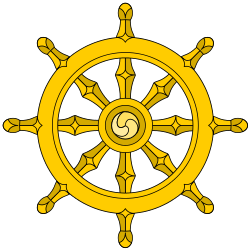Hara Tanzan
| Part of a series on |
| Zen Buddhism |
|---|
 |
|
Persons Chán in China
Zen in Japan Seon in Korea Zen in the USA Category: Zen Buddhists |
|
Awakening |
|
Practice |
|
Related schools |
| Part of a series on |
| Buddhism |
|---|
 |
|
Hara Tanzan (原坦山) (December 5, 1819 – July 27, 1892) was a Soto Buddhist monk, head monk at the Saijoji temple in Odawara[1] and a professor of Philosophy at the University of Tokyo during the Bakumatsu and Meiji periods. He was a forerunner of the modernization of Japanese Buddhism and the first (in Japan) to attempt to incorporate concepts from the natural sciences into Zen Buddhism.[2]
Hara was born in Iwakitaira Domain. At the age of 15, Hara enrolled at the Shoheizaka Academy (昌平坂学問所) where he studied both Confucianism and medicine, the latter under Taki Genken.[1] At the age of 20 or 26, he entered Buddhist priesthood, though he would go on to study Western medicine later in life.[3][4]
Hara became the first lecturer at Tokyo University's Department of Indian Philosophy and Buddhist Studies in 1879.[3][5][6] He was later also superintendent of the Soto-shu Daigaku-rin (currently Komazawa University).[4]
Hara figures in several well-known koans. He was well known for his disregard of many of the precepts of everyday Buddhism, such as dietary laws.
Appearance in Koan
The Muddy Road
This is one of the most famous stories of Tanzan.
- Tanzan and Ekido were once traveling together down a muddy road. A heavy rain was falling. As they came around a bend, they met a lovely girl in a silk kimono and sash, unable to cross at an intersection.
- "Come on, girl," said Tanzan at once. Lifting her in his arms, he carried her over the mud.
- Ekido did not speak until that night when they reached a lodging temple. Then he could no longer restrain himself. "We monks don't go near females," he told Tanzan, "especially not young and lovely ones. It is dangerous. Why did you do that?"
- "I left the girl there," said Tanzan. "Are you still carrying her?"[7]
A Buddha
In Tokyo in the Meiji era there lived two prominent teachers of opposite characteristics. One, Unsho, an instructor in Shingon, kept Buddha's precepts scrupulously. He never drank intoxicants, nor did he eat after eleven o'clock in the morning.
The other teacher, Tanzan, a professor of philosophy at the Imperial University, never observed the precepts. When he felt like eating he ate, and when he felt like sleeping in the daytime he slept.
One day Unsho visited Tanzan, who was drinking wine at the time, not even a drop of which is supposed to touch the tongue of a Buddhist.
'Hello, brother,' Tanzan greeted him. 'Won't you have a drink?'
'I never drink!' exclaimed Unsho solemnly.
'One who does not drink is not even human,’ said Tanzan.
'Do you mean to call me inhuman just because I do not indulge in intoxicating liquids!' exclaimed Unsho in anger. Then if I am not human, what am I?'
'A Buddha.' answered Tanzan. [8]
Death
Tanzan wrote sixty postal cards on the last day of his life, and asked an attendant to mail them. Then he died. The cards read:
- I am departing from this world.
- This is my last announcement.
- Tanzan. July 27, 1892.[9]
References
- 1 2 "美術人名辞典". SHIBUNKAKU Co., Ltd.
- ↑ Yoshinaga, Shinichi (30 October 2006). "The Psychologized Zen of HARA Tanzan : His Thought and Historical Influences". Society for Mind-Body Science (in Japanese). ISSN 0918-2489. Retrieved 28 November 2013.
- 1 2 世界大百科事典 第2版. Hitachi Solutions Business, Ltd. 1998.
- 1 2 デジタル版 日本人名大辞典+Plus. Kodansha. 2009.
- ↑
- ↑ 松村明. デジタル大辞泉. Shogakukan Inc.
- ↑ 長田, 幸康 (2011). ブッダに学ぶ生きる智慧: いまある不安や怒りが消えてなくなる本. 東洋経済新報社.
- ↑ http://www.ashidakim.com/zenkoans/13abuddha.html
- ↑ http://www.ashidakim.com/zenkoans/7announcement.html
- Reps, Paul; Nyogen Senzaki. Zen Flesh, Zen Bones: A Collection of Zen and Pre-Zen Writings. ISBN 0-8048-3186-6.